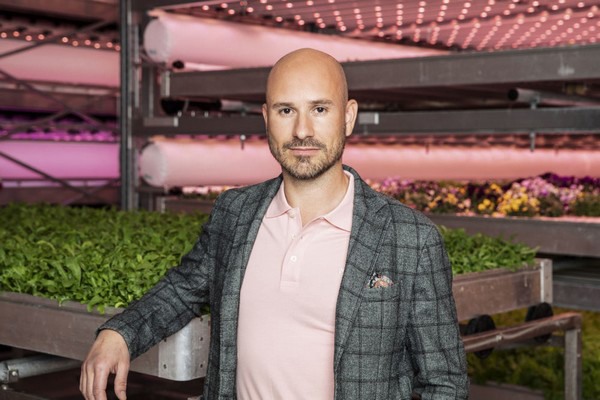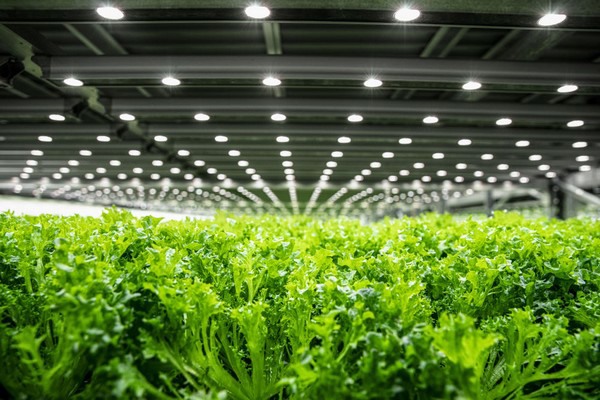Signif y is providing GreenPower LED technology for VAXA, Iceland’s first vertical farm. Vertical farming is where agriculture is carried out in controlled indoor conditions, where crops are grown under LED lighting in systems of stacked trays. With its cold climate and rocky, volcanic landscape, Iceland poses obvious challenges for traditional methods of farming, making it an ideal environment to explore the possibilities of vertical agriculture.
y is providing GreenPower LED technology for VAXA, Iceland’s first vertical farm. Vertical farming is where agriculture is carried out in controlled indoor conditions, where crops are grown under LED lighting in systems of stacked trays. With its cold climate and rocky, volcanic landscape, Iceland poses obvious challenges for traditional methods of farming, making it an ideal environment to explore the possibilities of vertical agriculture.
Showing how challenges can stimulate human inventiveness, Andri Bjorn Gunnarsson, founder and CEO of VAXA, initiated his country’s first and only vertical farm in 2017. Gunnarsson started VAXA, located outside Reykjavik, having worked in finance in the UK and Switzerland. His childhood friend, Andri Gudmundsson, joined a little later as his co-founder and partner. Trained as a physicist, Gudmundsson had also worked in finance, in Stockholm. “Like pretty much all good ideas, this started over a beer,” Gunnarsson says with a smile. “I always had the dream of starting my own company.”

The two founders’ vision was to solve one of Iceland’s everlasting problems – its reliance on imported food. They were also influenced by the impact of food imports on climate change, as many countries seek to boost local food production as a more sustainable model for agriculture.
“We need smarter ways than we currently have to produce food for a lot more people,” Gunnarsson says. “To take the first steps in a young industry like vertical farming, the Icelandic market is ideal in many ways,” he says, pointing to the country’s clean water, its educated workforce, and relatively short distances, which make logistics easier. What’s more, 100 percent of Iceland’s electricity is generated renewably. As Gunnarsson says: “If you want to run a vertical farm as a sustainable business, you must have renewable electricity.”
An absolute success
Less than five years after launching, VAXA is steadily producing lettuce heads, baby greens, microgreens, and herbs that it sells to restaurants, caterers and retailers. Consumers can also enjoy VAXA’s produce via a weekly farm-box subscription program. “It’s a collection of the good stuff that we have every week,” says Gunnarsson.
VAXA, located in the outskirts of Reykjavik, can now grow 10 times more produce than a greenhouse and 100 times more than a traditional farm, plus it can deliver within a 10-to-15-minute drive anywhere within the city. In addition, it can grow a million lettuce heads each year across its 1,600 square meters of growing space. It is already Iceland’s second-biggest producer of leafy greens and captured 10% of the Reykjavik area’s greens market, no small achievement for a start-up.

In addition to selling well, the VAXA brand is recognized among foodies, having figured in the recipes of the silver medal-winning Icelandic chef team at the 2019 Culinary Olympics. Iceland’s only Michelin-starred restaurant, is another VAXA customer. “We have restaurants that have the VAXA brand on their menus,” Gunnarsson says, noting how valuable such publicity is for VAXA’s retail sales. “The feedback we get is that the quality of the product is better than anything else available on the market in terms of taste, texture, color, and shelf life,” Gunnarsson adds.
Great lighting technology is crucial,
Purity, efficiency, control: these qualities are at the heart of vertical farming. So, it’s not surprising that VAXA’s growing facility looks like a high-tech clean room. Produce grows in symmetrical trays, attended by employees in white overalls and hairnets. An HVAC precisely adjusts temperature and humidity levels, while ceiling fans re-create the perfect wind conditions. No pesticides are necessary, because there are no pests.
Most strikingly, the windowless facility does not get any outside sunlight. Instead, illumination is provided by LED technology from Signify, a VAXA technical partner. VAXA uses Signify’s Philips GreenPower LED production modules. VAXA’s partnership with Signify’s horticultural lighting experts has been important as it even went beyond Signify’s provision of hardware. “Our collaboration and relationship with the Signify staff and their growth advice have been very good and we’ve only grown closer over the years. We have had weekly or biweekly contact with the plant scientists since the beginning,” says Gunnarsson. Signify’s plant specialists are an expert resource on which the VAXA team can rely at any time.
“Starting a company like this, in this field, you’re bound to encounter problems on the way, and the [Signify] guys have been very helpful,” says Gudmundsson. In a tech-intensive field, where slight gradations in performance can make a difference, trusting someone else to provide the right equipment is crucial. “We don’t feel that we have to develop a lot of the technology ourselves – we can leave that to companies like Signify,” he adds.
An ambition to grow
What’s next? VAXA, like any ambitious young company, is looking to expand. “Indoor farming can definitely contribute to the future,” says Gudmundsson, citing VAXA’s offer of quality produce, consistent output, resilient supply, and an ability to satisfy the changing habits of consumers who want environmentally friendly products. “We think we have something to say and something important to contribute. Working together with partners and having best-in-class equipment will not only help us practice faultless food production, but it will also enable us to scale our business further,” Gudmundsson says. “Indoor farming alone will not heal or repair the negative impact from global food production on the world, but it will play a key role in the future and help make agriculture a better and more sustainable business. For you and me to continue living on the planet, we need to develop these new technologies today in order for the entire human population to have enough food in the future. It’s a race against time and we are determined and dedicated to the task at hand.”
 For more information:
For more information:Signify
